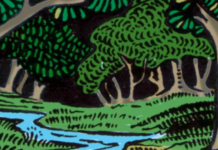
The Heretic’s Guide to Thelema
, by Gerald del Campo
Immanion Press, 9781905713189, 438 pp., 2008
Thelema? Isn’t that about the writings and magickal workings of Aleister Crowley? Didn’t he use drugs and sex magick? Wasn’t he called “the evillest man in the world”? What relevance can that have in today’s society? Kind of, yes, yes, and you’d be surprised. But that isn’t all Thelema is. Actually, I should say that it is not primarily what Thelema is, any more than the writings of any prophet. All of the above statements and questions are representative of the common perception of Thelema. And we all know how accurate common perceptions are (cough, cough).
I am not a practicing Thelemite (or any form of Thelemite for that matter) which makes me the target audience for this book since this a “101” book, but with a difference. Most “beginner” books simply rehash what has been written before (often dozens if not hundreds of times). This book is designed to introduce the entire concept of Thelema and its associated magick from a personal viewpoint.
Naturally, there are recaps of standard magickal fare – including certain rituals and invocations – but in the first part of the book the emphasis is on personal experience as opposed to theory. Perseverance is stressed since the magickal world, unlike modern Western society, is based on the long-term. There are no short cuts in this work.
The first two books in this three book compilation (New Aeon Magick and New Aeon English Qaballah) have been previously published (1994 and 2001, respectively), and they raised various controversies at the times of their publication. The third book (Ethics of Thelema) has never before been published and offers a look at the author’s view of the relationship of Thelema, as he understands and practices it, to the larger world.
Although I call this a “101” book, it is not for the casual dabbler. As with any book devoted to magickal working as opposed to magickal theory it is heavy on experiential goals, and requires some serious effort to put into practice.
One of the primary purposes of this book, if not the primary purpose, is to cause the reader to question everything. This makes it a difficult book for the average reader. It is also dangerous to the status quo since it encourages challenges to commonly accepted viewpoints.
This book (or, actually, these books) is not about Thelema as a whole, but rather about the author’s personal understanding of it. As such, it is intended to encourage contemplation leading to action. Contemplation is the starting point; action is the journey; and self-knowledge is the destination.
If you know nothing about Thelema, and want to, this book is for you. If you are a practicing Thelemite, this book may shock you into re-examining your thoughts. In either case, it is a worthwhile addition to your library.








